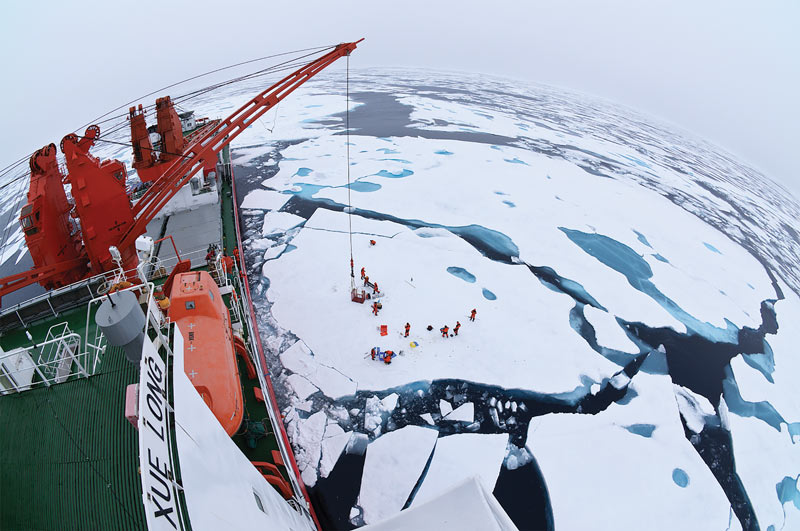
Chinese scientists conduct research in the Arctic Ocean from the icebreaker Xue Long in 2010.[Timo Palo/Wikimedia]
Three in four Canadians polled in May 2023 had a negative view of the Chinese government. Given the ongoing tensions between the two countries, it’s hard to fathom that has improved much in the interim.
“It speaks to how strained the relationship is,” said pollster Nik Nanos at the time, noting that many nations engage in activities that advance their interests. But while many of them do so transparently through diplomats, by supporting educational exchanges and research with Canadian universities and hiring lobbyists to help them, China’s approach appears “unsavoury” to some.
Indeed, the Chinese government has been practising so-called elite capture in Canada for years now. China traded paid trips, legal and business opportunities and research access to essentially secure the support of prominent Canadian political, legal and academic leaders to speak positively about and support the country’s interests.
It does so largely through its United Front Work Department, which gathers intelligence on, manages relationships with, and attempts to gain influence over high-profile individuals and organizations outside of the country. The department also aims to influence the 1.7 million Canadians of Chinese origin.
More covert Chinese interference was exercised in Canadian elections.
For instance, Chinese students attending universities here were bused to nomination meetings to support candidates favourable to Beijing. And the Conservatives insist that the 2021 election results in as many as six ridings were heavily influenced by Canadian-based, Chinese-language TV and social networks, almost all of which are owned by Beijing-friendly interests.
All of this is now under investigation by the federal Foreign Interference Commission. At least one Chinese diplomat has now been expelled from Canada.
Zhao Wei left in May 2023 over allegations he participated in intimidating a Conservative MP.
And there’s more. The high-security National Microbiology Lab in Winnipeg dismissed two Chinese scientists in July 2019. A Canadian Security Intelligence Service report on the duo indicated that they had, among other concerning behaviours, provided Beijing “with the Ebola genetic sequence, which opened a door of convenience for China,” and let two employees of a Chinese institution “whose work is not aligned with Canadian interests” into the lab. No charges were laid.
Meanwhile, cyber criminals based in China hacked nearly 10,000 devices in Canada and used them to attack government departments, corporations and individuals, seeking data on inventions, sensitive files and personal data. It’s believed that the Chinese government directs and benefits from such activities.
In trade terms, China’s massive and productive population has demonstrated it can produce both high-quality and inexpensive goods. Take electric vehicles (EVs), for instance, available in China for about $14,000, much less than EVs in Canada. In October 2024, Ottawa imposed a 100 per cent tariff on Chinese-made EVs (the U.S. did similarly in May), in an attempt to protect the billions federal and provincial governments have invested in EV-battery production.
After Canada announced the move, a spokesperson for China’s Ministry of Commerce said, “China is strongly dissatisfied and firmly opposes this” and that it “severely impacted China-Canada economic and trade relations.” More tension with Beijing.
The strain is amplified, too, by China’s global ambitions.
The Chinese government has been practising so-called elite capture in Canada for years now.
Beijing claims, for instance, that the South China Sea is its territorial waters, despite the fact the assertion violates the United Nations Convention on the Law of the Sea. To support its position, Chinese Coast Guard vessels intimidate fishermen from the Philippines and Vietnam in international waters, for example. It has also built airstrips and garrisons on previously uninhabited islands and sandbars in the region, notably on the Paracel and Spratley islands, again in violation of the UN convention.
The result, not surprisingly, is that the Philippines is growing its military force, and western navies, including frigates of the Royal Canadian Navy, now make freedom-of-navigation sailings through the sea, often shadowed by naval vessels of the fast-growing People’s Liberation Army (PLA).
Then there’s Taiwan, where Chinese Nationalist forces fled after Chinese Communists defeated them in 1949. Taiwan has since considered itself an independent country, but Beijing, especially under Xi Jinping, China’s president since 2013, claims that it still belongs to it—and it will incorporate the island nation into China by force if necessary. Frequent military exercises on the Chinese coast and intrusions by PLA aircraft and navy ships regularly stir up trouble and raise tensions.
While the U.S. hasn’t definitively stated it will defend Taiwan if China attacks it, Ely Ratner, the U.S. Assistant Secretary of Defense for Indo-Pacific Security Affairs, said in September 2023 that “transformative achievements with Japan, Australia and the Philippines, among others, will make our force posture across the [region] increasingly distributed, mobile, resilient and lethal.”
Some defence experts now argue that China has become the most significant threat to American power and has outgunned the U.S. War between the two would be difficult to contain, could involve nuclear weapons, and would likely draw in other countries, including Canada.
For its part, Canada is also becoming worried by Chinese ambitions in the Arctic. As global warming accelerates sea ice melt, new natural resources may become accessible in the region. It’s believed China is eyeing access to such fisheries, oil and mineral deposits. Some of these are likely in international waters, others probably in Canada’s marine boundaries. Regardless, Chinese research ships have been conducting surveys in the region and China has declared itself a near-Arctic state. In a 2018 Arctic policy paper, it declared an intent to be a “polar great power” by 2030.
China’s commercial shipping is also eyeing the Arctic as a cost-saving route between Asia and Europe once the ice melts and navigation becomes easier. There are increased risks of pollution of the relatively pristine waters as traffic increases, which will likely affect Canada. Meanwhile, Canada has limited defences in the Arctic, and as Chinese—and Russian—interests in the region continue to grow, Ottawa will need to change its defence policies.
Thus, it’s no wonder Canadian opinion on China has hardened. People can see the threat from what Globe and Mail columnist Andrew Coyne called China’s “brutal gang of thugs.” Now, the government needs to see it, too, and act to protect Canada’s interests.
Advertisement




















